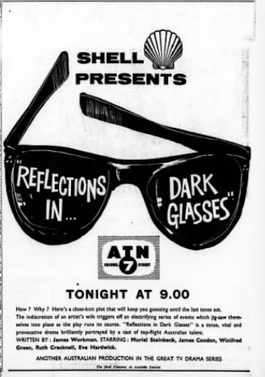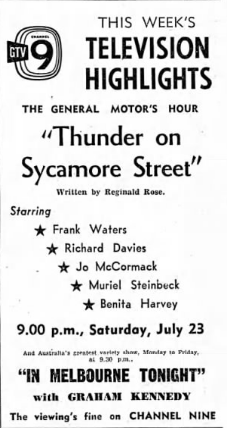Autumn Affair is an Australian television soap opera made by and aired by Network Seven station ATN-7, and also shown in Melbourne on Nine Network station GTV-9. Television in Australia had only been broadcasting since 1956 and Seven Network was the first commercial station to make drama a priority.
The One Day of the Year is a 1958 Australian play by Alan Seymour about contested attitudes to Anzac Day.

Shell Presents was an early attempt at Australian television drama, being an umbrella title for several different productions. It debuted on 4 April 1959, and aired on ATN-7 and GTV-9, who split production of plays for the series between them. It was an anthology series, each program being a self-contained play for television. The series won a Logie award in 1960 for TV Highlight of 1959. As the title suggests, it was sponsored by Shell. It was described as "a very big deal for the station: major institutional sponsorship from international companies for locally produced drama." It would be followed by The General Motors Hour.

Stormy Petrel is an early Australian television drama. A period drama, the 12-episode serial told the story of William Bligh and aired in 1960 on ABC. It was the first live TV serial from the ABC.

"Reflections in Dark Glasses" is an Australian television film, or rather a television play, which aired in 1960. It aired as part of Shell Presents, which consisted of monthly presentations of stand-alone television dramas. It was written by Sydney writer James Workman, and is notable as an early example of Australian-written television drama. It was broadcast live in Sydney on 6 February 1960, then recorded and shown in Melbourne.

"They Were Big, They Were Blue, They Were Beautiful" is an Australian television movie, or rather a live television play, which aired live on 27 June 1959 in Sydney, and on 8 August 1959 in Melbourne. It aired as part of Shell Presents, a monthly presentation of standalone productions which aired from 1959 to 1960 on ATN-7 in Sydney and GTV-9 in Melbourne.
Treason is a 1959 Australian television live drama, which aired on ABC about the 20 July plot during World War Two. Originally broadcast 16 December 1959 in Melbourne, a kinescope ("telerecording") was made of the program and shown in Sydney on 13 January 1960. It was an adaptation of a stage play by Welsh writer Saunders Lewis, which had previously been adapted as an episode of BBC Sunday-Night Theatre.

"The Big Day" is an Australian television film, or rather a live television play, which aired in 1959. The fifth episode of the Shell Presents presentations of standalone television dramas, it originally aired 11 July 1959 on Melbourne station GTV-9, a video-tape was made of the broadcast and shown on Sydney station ATN-7 on 25 July 1959.

"Man in a Blue Vase" is an Australian television one-off comedy presentation which aired in 1960. It was part of Shell Presents, which consisted of monthly presentations of standalone television dramas and comedies. It aired on 19 March 1960 on GTV-9 in Melbourne and on 5 March 1960 on ATN-7 in Sydney, as this was prior to the creation of the Seven Network and Nine Network.
"Manhaul" is a 1962 Australian television film. It aired 8 September 1962 as part of The General Motors Hour, an occasional series which presented various one-off productions. It aired on 8 September 1962 on ATN-7 in Sydney, on 8 September 1962 on GTV-9 in Melbourne, and on 15 September 1962 on QTQ-9 in Brisbane, despite the two stations having severed their relationship with the formation of the Nine Network.

The Sergeant from Burralee is an Australian television play written by Phillip Grenville Mann. The play was also broadcast by the BBC and screened for West German television.

"A Tongue of Silver" is an episode of the 1959 Australian TV drama anthology Shell Presents. Australian TV drama was relatively rare at the time. It starred John Meillon, who had been in Thunder of Silence in the same series.
Eye of the Night is a 1960 Australian television play. It was written by Kay Keavney and directed by Christopher Muir.
"The Concert" is a 1961 Australian TV GTV-9's Melbourne studios. It was directed by Rod Kinnear. Australian TV drama was relatively rare at the time. The episode aired on 3 June 1961 in Melbourne, and on 10 June 1961 in Brisbane.

"Ruth" is a 1959 Australian television play. It was presented as part of the Shell Presents program and starred Lyndall Barbour. It was written by John Glennon, an American actor and writer who appeared in the production, and directed by Rod Kinnear. The play aired in Melbourne on 5 September 1959 and in Sydney on 19 September 1959.

"Thunder on Sycamore Street" is a 1960 Australian television play directed by David Cahill. It was based on a script by Reginald Rose. It aired on 23 July 1960 in Melbourne and Sydney.
Silo 15 is a 1969 Australian short feature. It was shot in 1969 and was produced by Grahame Jennings and directed by John Alaimo.
"The Grey Nurse Said Nothing" is a television play episode from the Australian television series The General Motors Hour. It was produced and directed by David Cahill, and is based on the real life murder of Jim Smith, the so-called Shark Arm case. It was made by Channel Seven who later called "the most ambitious dramatic production ever attempted in Australia... [written by] one of the world's foremost authors of television plays and the cast is Ihe largest ever assembled for an Australian television dramatic production.... the greatest care has been taken to achieve the maximum possible standard in the production of the play which covered a total period of approximately eight weeks." The episode aired on 28 May 1960 in Sydney and Melbourne, and on 11 June 1960 in Brisbane.
"Shadow of a Pale Horse" is a television play that was produced for Australian TV by Sydney station ATN-7, it was also shown in Melbourne on station GTV-9, as this was prior to the creation of the Seven Network and Nine Network. "Shadow of a Pale Horse" aired on 17 September 1960 in Melbourne and Sydney.










